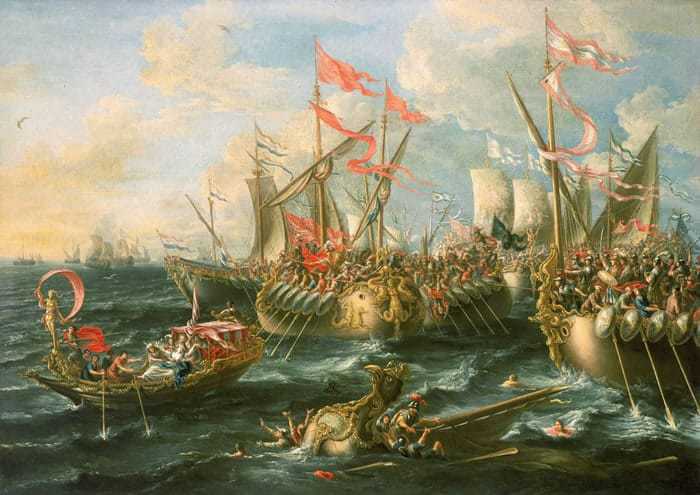Not only is the Battle of Actium in 31 BC among the most crucial battles of the ancient world, but it is also arguably one of the most important of all time. It was the significant conflict in the war between Octavian and Mark Antony; the former was victorious and became the first Emperor of Rome in 27 BC. It was the beginning of an empire that lasted over 500 years in the West and almost 1,500 in the East.
Civil War
When Julius Caesar was assassinated in 44 BC, a brutal civil war ensued. Cassius and Brutus, chief conspirators in the murder of Caesar, led one faction. Mark Antony, lieutenant of Caesar, and Octavian, Caesar’s adopted son and heir led the other. The Caesarians won the day with a decisive victory at Philippi in 42 BC. The winners divided the empire; Mark Antony took the West, Octavian the East while Lepidus, the other member of the Second Triumvirate, went to Africa.
Although they fought together against a common foe, Octavian and Mark Antony always had strained relations. Octavian married off his sister, Octavia, to his co-power wielder in 40 BC but the womanizing general fell for the charms of Egyptian Queen Cleopatra just like Caesar before him. By 37 BC, Mark Antony left Octavia and traveled to Syria to live with his Egyptian heiress who had already bore him twins (a boy and a girl). He apparently married Cleopatra, which broke Roman rules regarding marriage with foreigners.
It was also alleged that he offered her Roman land which was tantamount to treason. Octavian, outraged by his rival’s treatment of his sister and seeming disregard for the Roman law, prepared for war.

Changing the Course of History
Octavian had probably been anticipating war for some time and was well prepared. In 31 BC, his general Agrippa captured the Greek town of Methone which was an ally of Antony. Agrippa sailed with 300 war galleys and took up strategic positions in the western Peloponnese with the goal of cutting off his foe’s lines of communication and supply. It was a successful mission as Antony found it difficult to supply his huge army properly. Also, Octavian established a bridgehead at Ambracia with 120,000 men.
Antony was also well prepared; he spent the winter of 32 BC in Ephesus with Cleopatra and boasted an army of 115,000 men, 230 warships, and 50,000 sailors. He initially wanted to cross into Italy, but Octavian halted him by landing at Dalmatia with 100 ships. Antony marched to the Gulf of Ambracia in the hope that Octavian would meet him in battle but was disappointed as his rival refused to engage. It was a wise move by Octavian as Antony was the far better commander.
By cutting off Antony’s supplies, Octavian gained control of the situation. As Antony’s men began to grow weak with hunger, he knew it was necessary to break out of Ambracia. However, this meant a battle at sea which suited Octavian because he could rely on the services of Agrippa who was a superb admiral. In contrast, Antony’s abilities were mainly confined to land battles as he never showed capability in a sea battle. On September 2, 31 BC, the Battle of Actium, a fight that changed the world, took place in the Ionian Sea.

